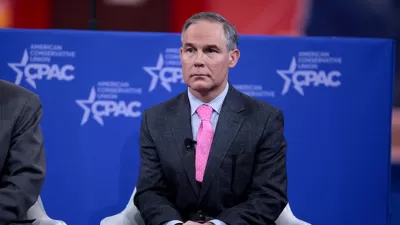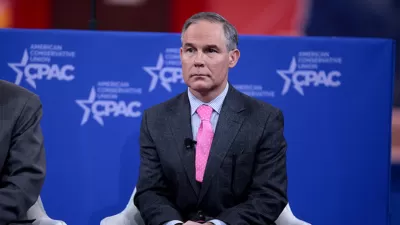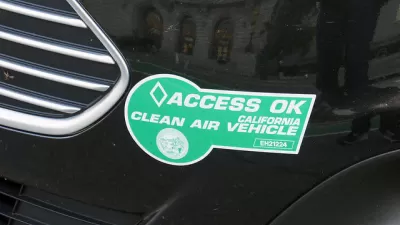Perhaps there never really was much difference between 'skepticism' and 'denial'. Scott Pruitt certainly proved that on Thursday when he answered CNBC's Joe Kernen's question if carbon emissions are the primary cause of climate change.

Joe Kernen and Andrew Ross Sorkin, co-anchors of CNBC's "Squawk Box", engage in a wide-ranging, 11-minute Q & A (video) on Thursday with U.S. Environmental Protection Agency Administrator Scott Pruitt that touch many issues covered by Planetizen since Pruitt's confirmation (when he was labeled a climate skeptic) on Feb. 17, including the rollbacks, proposed or accomplished, of:
- Fuel efficiency standards for model year 2022-2025 passenger vehicles
- Clean Power Plan rule
- Waters of the United States (WOTUS) rule [see presidential executive order]
- Methane information collection request
However, the real issue exposed was Pruitt's belief, or more accurately, disbelief, on the roles of carbon emissions and human activity in climate change, thanks to Kernen's simple yet insightful question asked at the very last minute (see 1:12 minute video) of the interview. Had the prior 10-minutes of Q and A not occurred, though, I wonder if Pruitt would have answered as directly, rather than evasively, as he did. Kernen asks:
Just to get to the nitty gritty, do you believe that it's been proven that CO2 is the primary control knob for climate?
Pruitt responds:
No, I think that measuring with precision human activity on the climate is something very challenging to do and there is tremendous disagreement** about the degree of impact, so no, I would not agree that it's a primary contributor to the global warming that we see, but we don't know that yet, so we need to continue the debate and review and analysis.
"That view contradicts the stance of the Environmental Protection Agency itself, as well as the conclusion of NASA (National Aeronautics and Space Administration) and the National Oceanic and Atmospheric Administration (NOAA)," writes Tom DiChristopher for CNBC on reactions from the political, environmental, and science communities.
Sen. Tom Carper, the ranking Democrat on the Senate Committee on Environment and Public Works, tweeted about the comment, "I think 97% of the world's scientists were surprised to learn this today! I know I was."
Carper was referring to a frequently cited study that found 97 percent of climate scientists who issued findings on the cause of climate change ascribe the phenomenon to human activity. Those findings have been disputed.
The EPA lists carbon dioxide as composing 81 percent of greenhouse gas emissions in 2014.

Courtesy of E.P.A.: Overview of Greenhouse Gases
Ironically, CNBC's Kernen, who expresses uncertainty about the the role of carbon dioxide as a pollutant during the interview, ends with a statement about climate denial (courtesy of Media Matters):
But I don’t want to be called a denier, so it scares me. It’s a terrible thing to be called. Anyway, administrator Pruitt, I know you don’t want to be called that either...
Pruitt was in Houston to appear as a guest speaker for the oil industry gathering known as CERA (previously Cambridge Energy Research Associates) Week. Pruitt told Kernan that he wanted to convey to them a message that you can be pro-growth, pro-jobs, and pro-environment.
Coral Davenport of The New York Times also reports on Scott Pruitt's admission that carbon emissions are not the primary driver of climate change.
**Science Daily defines the Global Warming Controversy, derived from Wikipedia, and notes that "there is also a small but vocal number of scientists in climate and climate-related fields that disagree with the consensus view."
FULL STORY: Scott Pruitt's latest climate change denial sparks backlash from scientists, environmentalists

Planetizen Federal Action Tracker
A weekly monitor of how Trump’s orders and actions are impacting planners and planning in America.

Congressman Proposes Bill to Rename DC Metro “Trump Train”
The Make Autorail Great Again Act would withhold federal funding to the system until the Washington Metropolitan Area Transit Authority (WMATA), rebrands as the Washington Metropolitan Authority for Greater Access (WMAGA).

The Simple Legislative Tool Transforming Vacant Downtowns
In California, Michigan and Georgia, an easy win is bringing dollars — and delight — back to city centers.

The States Losing Rural Delivery Rooms at an Alarming Pace
In some states, as few as 9% of rural hospitals still deliver babies. As a result, rising pre-term births, no adequate pre-term care and "harrowing" close calls are a growing reality.

The Small South Asian Republic Going all in on EVs
Thanks to one simple policy change less than five years ago, 65% of new cars in this Himalayan country are now electric.

DC Backpedals on Bike Lane Protection, Swaps Barriers for Paint
Citing aesthetic concerns, the city is removing the concrete barriers and flexposts that once separated Arizona Avenue cyclists from motor vehicles.
Urban Design for Planners 1: Software Tools
This six-course series explores essential urban design concepts using open source software and equips planners with the tools they need to participate fully in the urban design process.
Planning for Universal Design
Learn the tools for implementing Universal Design in planning regulations.
Smith Gee Studio
City of Charlotte
City of Camden Redevelopment Agency
City of Astoria
Transportation Research & Education Center (TREC) at Portland State University
US High Speed Rail Association
City of Camden Redevelopment Agency
Municipality of Princeton (NJ)





























